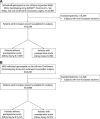Limited clinical utility for GWAS or polygenic risk score for postoperative acute kidney injury in non-cardiac surgery in European-ancestry patients
- PMID: 36271344
- PMCID: PMC9587619
- DOI: 10.1186/s12882-022-02964-8
Limited clinical utility for GWAS or polygenic risk score for postoperative acute kidney injury in non-cardiac surgery in European-ancestry patients
Abstract
Background: Prior studies support a genetic basis for postoperative acute kidney injury (AKI). We conducted a genome-wide association study (GWAS), assessed the clinical utility of a polygenic risk score (PRS), and estimated the heritable component of AKI in patients who underwent noncardiac surgery.
Methods: We performed a retrospective large-scale genome-wide association study followed by a meta-analysis of patients who underwent noncardiac surgery at the Vanderbilt University Medical Center ("Vanderbilt" cohort) or Michigan Medicine, the academic medical center of the University of Michigan ("Michigan" cohort). In the Vanderbilt cohort, the relationship between polygenic risk score for estimated glomerular filtration rate and postoperative AKI was also tested to explore the predictive power of aggregating multiple common genetic variants associated with AKI risk. Similarly, in the Vanderbilt cohort genome-wide complex trait analysis was used to estimate the heritable component of AKI due to common genetic variants.
Results: The study population included 8248 adults in the Vanderbilt cohort (mean [SD] 58.05 [15.23] years, 50.2% men) and 5998 adults in Michigan cohort (56.24 [14.76] years, 49% men). Incident postoperative AKI events occurred in 959 patients (11.6%) and in 277 patients (4.6%), respectively. No loci met genome-wide significance in the GWAS and meta-analysis. PRS for estimated glomerular filtration rate explained a very small percentage of variance in rates of postoperative AKI and was not significantly associated with AKI (odds ratio 1.050 per 1 SD increase in polygenic risk score [95% CI, 0.971-1.134]). The estimated heritability among common variants for AKI was 4.5% (SE = 4.5%) suggesting low heritability.
Conclusion: The findings of this study indicate that common genetic variation minimally contributes to postoperative AKI after noncardiac surgery, and likely has little clinical utility for identifying high-risk patients.
Keywords: Acute kidney injury; Genome-wide association study; Polygenic risk score; Surgery.
© 2022. The Author(s).
Conflict of interest statement
The authors declare that they have no competing interests.
Figures
Similar articles
-
Genetic predisposition may not improve prediction of cardiac surgery-associated acute kidney injury.Front Genet. 2023 Apr 13;14:1094908. doi: 10.3389/fgene.2023.1094908. eCollection 2023. Front Genet. 2023. PMID: 37124606 Free PMC article.
-
Derivation and External Validation of a Risk Index for Predicting Acute Kidney Injury Requiring Kidney Replacement Therapy After Noncardiac Surgery.JAMA Netw Open. 2021 Aug 2;4(8):e2121901. doi: 10.1001/jamanetworkopen.2021.21901. JAMA Netw Open. 2021. PMID: 34424303 Free PMC article.
-
Polygenic Score for the Prediction of Postoperative Nausea and Vomiting: A Retrospective Derivation and Validation Cohort Study.Anesthesiology. 2025 Jan 1;142(1):52-71. doi: 10.1097/ALN.0000000000005214. Anesthesiology. 2025. PMID: 39250560 Free PMC article.
-
Risk factors for acute kidney injury after pediatric cardiac surgery: a meta-analysis.Pediatr Nephrol. 2022 Mar;37(3):509-519. doi: 10.1007/s00467-021-05297-0. Epub 2021 Sep 30. Pediatr Nephrol. 2022. PMID: 34595570 Review.
-
Preoperative risk prediction models for acute kidney injury after noncardiac surgery: an independent external validation cohort study.Br J Anaesth. 2024 Sep;133(3):508-518. doi: 10.1016/j.bja.2024.02.018. Epub 2024 Mar 24. Br J Anaesth. 2024. PMID: 38527923
Cited by
-
Multiancestry transferability of a polygenic risk score for diverticulitis.BMJ Open Gastroenterol. 2024 Sep 23;11(1):e001474. doi: 10.1136/bmjgast-2024-001474. BMJ Open Gastroenterol. 2024. PMID: 39313293 Free PMC article.
-
Perioperative Acute Kidney Injury: Diagnosis, Prediction, Prevention, and Treatment.Anesthesiology. 2025 Jan 1;142(1):180-201. doi: 10.1097/ALN.0000000000005215. Anesthesiology. 2025. PMID: 39527650 Free PMC article.
-
Expanding the All of Us Research Platform Into the Perioperative Domain.JAMA Surg. 2025 Feb 1;160(2):220-221. doi: 10.1001/jamasurg.2024.2343. JAMA Surg. 2025. PMID: 39693078
-
Genome-wide association study of hospitalized patients and acute kidney injury.Kidney Int. 2024 Aug;106(2):291-301. doi: 10.1016/j.kint.2024.04.019. Epub 2024 May 24. Kidney Int. 2024. PMID: 38797326 Free PMC article.
-
Updating probability of pathogenicity for RYR1 and CACNA1S exon variants in individuals without malignant hyperthermia after exposure to triggering anesthetics.Pharmacogenet Genomics. 2025 Feb 1;35(2):65-72. doi: 10.1097/FPC.0000000000000551. Epub 2025 Jan 2. Pharmacogenet Genomics. 2025. PMID: 39745345
References
Publication types
MeSH terms
Grants and funding
LinkOut - more resources
Full Text Sources
Miscellaneous


